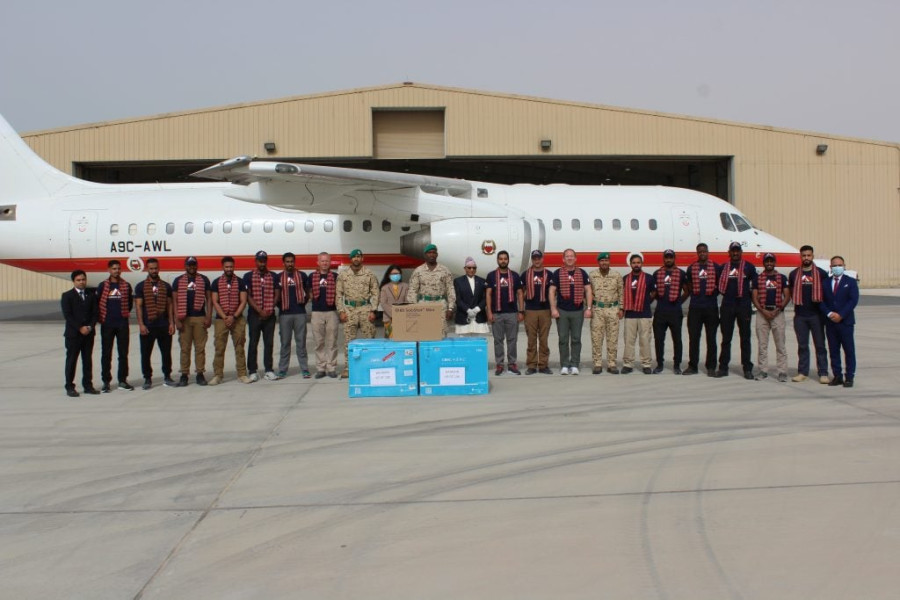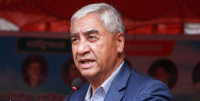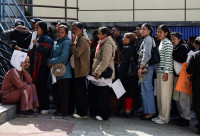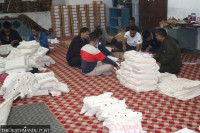National
Nepal drug regulator launches probe into how Covid-19 vaccines from Bahrain arrived in Kathmandu
Communication mix-up blamed, as Foreign Ministry knew and the Health Ministry did not. The jabs were brought by a Bahrain royal member-led team on an Everest expedition mission.
Arjun Poudel
The Embassy of Nepal in Bahrain said in a statement on Monday that a Bahrain Everest expedition led by a member of its royal family would “provide 2,000 doses of Covid-19 vaccine as a gift” to the locals of Samagaun of Tsum Nubri Rural Municipality in Gorkha district.
The Shaikh Mohamed Hamad Mohamed Al Khalifa-led team, which had successfully climbed the 8,156-metre Manaslu in Gorkha district last year, arrived in Kathmandu on Monday to attempt the Everest summit.
At a time when the government is scrambling to get Covid-19 vaccines for its people, the 2,000 doses announced by Baharain would normally be welcome.
But with these 2,000 doses, there is a hitch.
Nepal’s drug regulatory authorities are unaware of the ‘import’ of the Oxford-AstraZeneca vaccines that came with the Bahraini team that arrived on Monday.
The Department of Drug Administration has started an investigation into the import of the vaccines without fulfilling legal procedures.
“We have deployed a team of drug inspectors to investigate how the vaccines were brought into the country without any prior approval,” Bharat Bhattarai, director general of the Department of Drug Administration, told the Post. “We did not know that vaccines were being imported from Bahrain.”
Bhattarai said his office is coordinating with the Ministry of Foreign Affairs and Ministry of Health and Population regarding the matter.
According to Bhattarai, anyone importing any medicine or vaccine into Nepal must fulfil the necessary legal procedures.
To import any medicine or vaccine to Nepal, relevant documents as well as storage guarantee of cold chain maintenance and expiry dates must be provided to the drug regulator.
It, however, was not immediately clear as to which Nepali authorities the Bahrain team is coordinating with to “provide” the vaccines to the villagers in Gorkha.
Whether the vaccines can be provided to the people of Samagaun of Tsum Nubri Rural Municipality is another question, as the government has prepared a list of priority groups for the vaccines.
Ever since Nepal launched its vaccination drive on January 27, the government has been inoculating the populations by prioritising the risk groups.
The first round of the second phase of vaccination, which is ending today, was aimed at inoculating people above 65 years of age. The government is now considering vaccinating people above 60.
With the government unable to procure sufficient vaccines, it has decided to allow private firms to import the vaccine, and for this, the Department of Drug Administration has sought applications from interested companies.
With the case of the vaccines provided by Bahrain, officials at the Ministry of Health said that a special decision is needed to allow people of all eligible age groups of some particular place to get the vaccine.
Since such a scenario had not been envisioned, no discussions have been held as of now, according to the officials.
“Even if the vaccine has been brought in good faith, all legal and technical procedures must be followed,” an official at the Health Ministry told the Post requesting anonymity as he feared getting embroiled in controversy.
Dr Samir Kumar Adhikari, joint spokesperson for the Health Ministry, said that the ministry has directed the Department of the Drug Administration to look into the issue, as the matter falls under its jurisdiction.
“It has been found that the Nepali embassy in Bahrain coordinated only with the Ministry of Foreign Affairs and not with the concerned agency under the Health Ministry,” Adhikari told the Post.
Officials at the Ministry of Foreign Affairs, however, claimed that they had forwarded the letter of the Nepali embassy in Bahrain to the Health Ministry.
“We have forwarded the letter sent by our embassy in Bahrain to the Health Ministry,” Sewa Lamsal, spokesperson for the Ministry of Foreign Affairs, told the Post. “It seems that the letter did not reach the concerned agencies in time. Our officials have been coordinating to resolve the issue.”
Another official at the Foreign Ministry said the vaccine had arrived before the Health Ministry gave the approval to bring them.
With the import of the vaccine by the Bahrain royal’s team, without fulfilling due procedures, questions have arisen as to who can import the vaccine and who cannot.
Officials at the Health Ministry said that anyone who could afford to bring the vaccine or medicine would bring them in future if rules and regulations are compromised.
“Some other people can say that they will bring certain doses for a certain number of people or for their family members and relatives,” said another Health Ministry official who also requested anonymity. “And how can we allow the jabs to the population of a certain area only? Isn't it the responsibility of the government to ensure equal distribution?”
The Bahrain team’s Everest expedition is being managed by Seven Summit Treks.
An official at Seven Summit Treks said that the team had fulfilled all due procedures as suggested by the Embassy of Nepal in Bahrain.
“One thousand doses of vaccine were requested by the Nepali embassy itself and another 1,000 doses were given by Bahrain on their own. As per the plan, the team was expected to meet the Health Ministry officials at the airport to hand over the vaccines and for storage, but now it looks like they were not informed,” the official told the Post who did not want to be named. “It is a shameful affair as the Foreign Ministry itself requested for the vaccine but failed to complete the due procedure.”
The Post’s repeated attempts to contact officials of the Department of Drug Administration on the latest development on the issue later in the day went unanswered.
Dr Jageshwor Gautam, spokesperson for the Health Ministry, however, said that agencies under the Health Ministry and Foreign Affairs Ministry have been coordinating to resolve the issue. Gautam too declined to comment on the process to resolve the issue.
Asked what the government would do with the vaccines, Gautam said, “No one discards a child once born.”
“This [the Bahrain vaccines] has become a similar case.”
Sangam Prasain contributed reporting.




 21.88°C Kathmandu
21.88°C Kathmandu














